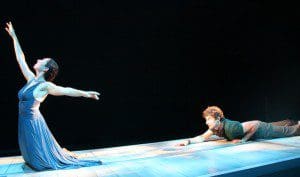
The Cutting Ball Theater’s production of Maurice Maeterlinck’s Pelleas and Melisande (translated by director Rob Melrose) exploits a long, narrow, catwalk-style stage (designed by Michael Locher) to set up intense relationships among the characters. In an early scene, Golaud (Derek Fisher), the prince of Allemonde, comes upon Melisande (Caitlyn Louchard) weeping by a spring. Melisande kneels over a small rectangular pool set into the stage floor while Golaud stands far away from her at the opposite end—this relationship, in different permutations, is revisited again and again. Charmed by her beauty and strangeness, Golaud marries Melisande and takes her to live with his family at their ancestral castle, where she falls in love with his younger brother, Pelleas (Joshua Schell).
In a wonderfully daring and silly piece of blocking, Melrose takes a “balcony” scene between Pelleas and Melisande and flips it 90 degrees, so that Pelleas climbing up the tower lies flat on his stomach, and Melisande leaning far out of the window sits with her legs stretched out in front of her. As Melisande hangs out of the window to speak with Pelleas, her hair falls out of the tower and covers his face; he clutches it and kisses it. The lovers are six feet apart, and it is the most sexual scene in the play. Louchard’s actual hair is pinned tightly to the back of her head, but the imaginary hair tumbling from the tower is unchaste and unrestrained. It’s always falling into springs and out of windows—Pelleas cries, “All of your hair, Melisande, all of your hair has fallen from the tower!” It’s the words all of that carry such an erotic charge. It’s as if she’s naked, as if all of her clothes have fallen off.
Louchard’s Melisande has a scraped-raw vulnerability that makes her both hard to watch and impossible to look away from. She spends many of her scenes literally weeping from eyes open so wide the lids seem pinned to her forehead. The attention focused on Melisande in every scene is relentless. Hardly an exchange passes without one of the men remarking on her beauty, and the gaze of each character (and of every audience member on either side of the stage) seems to pin her in place. She has the look, sometimes, of a person staring into a searchlight. She looks like she constantly expects violence. Her gown (costume design by Raquel Barreto) is open-backed, adding to the exposure, especially as the play’s other women are wrapped in layers, their hair covered.
Derek Fisher is marvelous and terrifying as Golaud. In the beginning he seems like an indulgent father, a gentle giant who loves to hunt and romp in the forest, touchingly baffled by the mystery of Melisande—he can’t believe his good luck. The growing intimacy between his young wife and his younger brother corrodes the jolly facade, revealing a sadistic predator (who has some of the funniest lines in the play).
The height difference between Fisher and Louchard is punishing, rendered all the more effective because they rarely touch, usually standing some distance apart. In a scene where Golaud, wounded on the hunt, reassures his wife he’s not badly hurt, he lies on a platform at one end of the stage, while she stands at the other—their heads are level. When he finally approaches her, his height advantage makes him seem like a monster. (At their first meeting, Melisande asks, “Are you a giant?” “I’m a man no different from other man,” he answers). He towers over her and stares down aggressively into her eyes, pushing on her with his gaze. It’s almost as if Fisher/Golaud can sense the audience’s discomfort and then gets defensive about it; he says, “Why are you looking at me as if I were a beggar? I’m not coming here asking you for alms.” In a no less erotic but considerably more problematic reversal of the tower scene, Golaud pushes Melisande to her knees and stands behind her, holding her “hair” in his hands, violently yanking it and twisting her body back and forth. The ingenious blocking of the tower scene blossoms here, as Golaud stands in the spot where Melisande was sitting, and Melisande kneels where Pelleas was lying, her imaginary hair streaming behind her in the opposite direction.
The characters in Pelleas and Melisande talk about light a lot; they seem to ascribe an importance to it that we can’t always understand. The urgency of the first conversation between the lovers, as they point out the lights of passing ships to each other, makes it seem as if they are already communicating on another level. The creepiest scene in the play is one we don’t actually witness. Hoping to spy on his wife, Golaud hoists his son onto his shoulders beneath her window. Yniold (ably, squeakily played by Jessica Jade Rudholm) describes the scene: Pelleas and Melisande stand far apart, against the walls of her room, and look“at the light” without blinking.
Yniold is disturbed and so are we—there’s something not quite human, something lizard-like, about the lovers. Are they afraid of the light, or afraid of it going out? Yniold gets down, and our “vision” sweeps away from the uncanny scene like the beam of a lighthouse, presumably leaving Pelleas and Melisande exactly where they were—absolutely still, eyes wide open. Without the aid of elaborate sets, using only the bodies of the actors, Melrose and the Cutting Ball create the high tower window, the massive gates, the abyssal galleries beneath the castle, the sea caves—narrow interior spaces for the text to play hide and seek, now in, now out of the light; now you see it, now you don’t.
Pelleas and Melisande, directed by Rob Melrose, runs through November 27 at the Exit Theatre in San Francisco.
